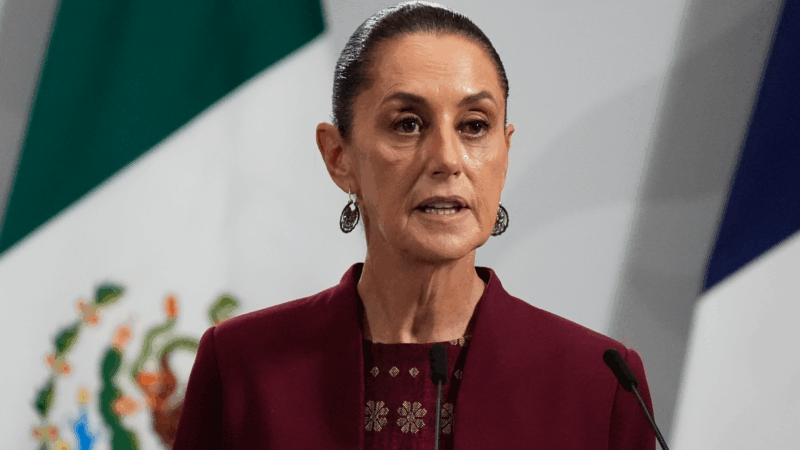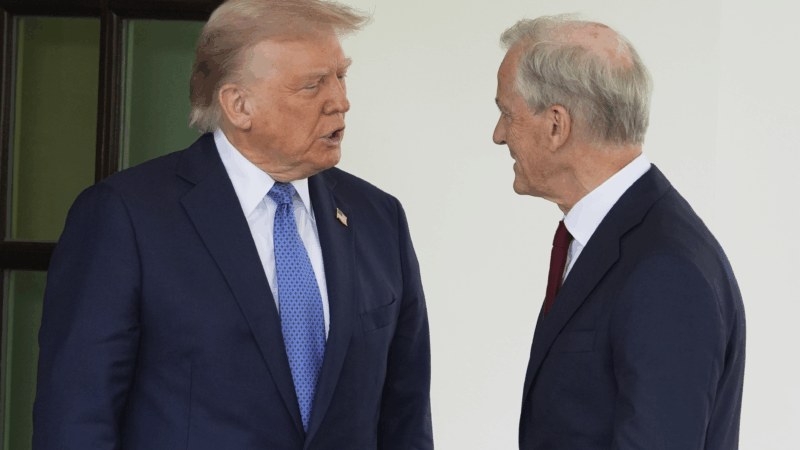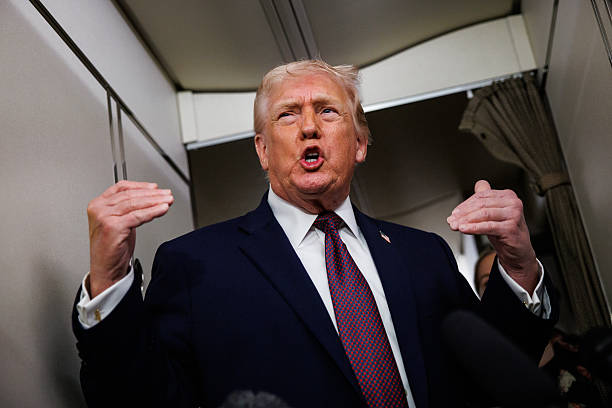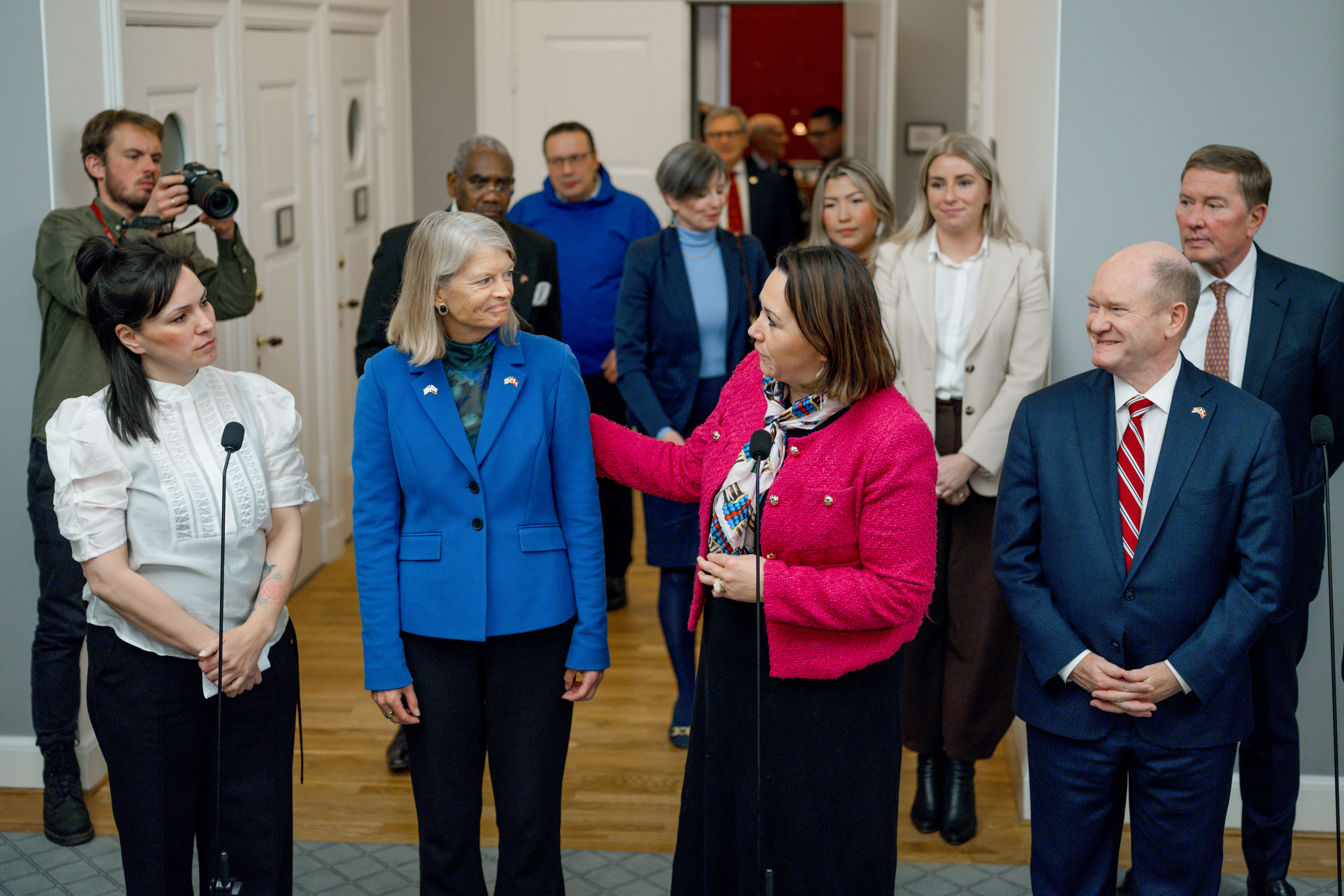Radio Free Europe/Radio Liberty sues Trump administration over canceled contract
Radio Free Europe/Radio Liberty sued the Trump administration on Tuesday to try to block it from terminating all federal funds for the U.S.-backed broadcaster.
In a federal lawsuit, the network argues that the U.S. Agency for Global Media (USAGM) has violated the Constitution and federal laws by withholding money Congress expressly allocated for the broadcaster. USAGM disburses funds to U.S.-backed international networks, including Radio Free Europe/Radio Liberty, that serve foreign lands without a free or robust press.
“This is not the time to cede terrain to the propaganda and censorship of America’s adversaries,” said Stephen Capus, the president and chief executive of Radio Free Europe/Radio Liberty, in a statement. “We believe the law is on our side and that the celebration of our demise by despots around the world is premature.”
The network says it presents news and information to 47 million people each week in 27 languages across 23 countries, including Afghanistan, Hungary, Iran, Pakistan, Russia, and Ukraine.
It is part of an historic effort at soft power, launched in 1950 to reach people living behind the Iron Curtain. It aims to advertise American ideals by presenting the news in its complexity, even when it involves debate or dissent.
The lawsuit names USAGM and two officials, Senior Adviser Kari Lake and Acting Chief Executive Victor Morales. The agency, Lake and Morales have not responded to NPR’s requests for comment.
Former USAGM general counsel David Kligerman, who left the agency as Trump took office for a second time, says the network had no choice but to sue.
“They have no other option,” Kligerman says. “None of the entities would want to enter litigation against the government. They receive their funds from the government. The relationship that the statute envisions is one of cooperation and coordination.”
The Trump administration has something different in mind.
On Friday, Congress passed a stopgap spending bill that included continuing funds for the agency and the network it funds. Later that night, the White House put out an executive order commanding the U.S. Agency for Global Media to limit its activities only to those that are “statutorily required” – that is, by law.
Radio Free Europe/Radio Liberty’s lawsuit articulates the need for the network and the value of the mission. It rests its case, however, on the idea that Congress has passed laws requiring the agency to spend the money, and that providing its coverage is legally required.
“This case challenges a federal agency’s refusal to abide by Congress’s power of the purse,” the lawsuit states in its opening lines. It adds that the question of whether to pass along those funds in the form of annual grants “is not an optional choice for the agency to make. It is the law.”
The legal argument appears to echo one made by current and former employees of the U.S. Agency for International Development in court. A federal judge ruled earlier Tuesday that the Trump administration likely violated the Constitution when it effectively shuttered the agency.
Lake acted over the weekend to shut down the Voice of America and Radio/TV Marti, which are owned by the federal government.
She also revoked contracts distributing the money Congress allocated for Radio Free Europe/Radio Liberty and their sister networks – including Radio Free Asia and the Middle East Broadcasting Networks. These networks are private not-for-profit corporations that are fully funded by the U.S. Congress.
Lake also terminated the contract of the Open Tech Fund, which helped develop the open source technology Signal and other secure messaging systems.
Radio Free Europe/Radio Liberty is the first of the networks to challenge Lake’s actions.
In a tweet Monday, Lake argued, “There’s too much rot in the United States Agency for Global Media to salvage.” She previously had said the networks offered value but were in need of dramatic reform. Appearing on the podcast of Steve Bannon, Trump’s former chief political strategist, Lake appeared to anticipate the lawsuit – and others – and taunted the networks’ leaders.
“They’ve probably worked all weekend – I hope they didn’t get any sleep,” Lake told Steve Bannon. “We’re going to continue to move forward and do what President Trump’s executive order said.”
USAGM on Saturday put all Voice of America staffers on indefinite paid leave, terminated all of its hundreds of contractual employees as of the end of the month and severed the contracts with Radio Free Europe/Radio Liberty and the other outfits.
The moves were denounced by Congressional Democrats, international diplomats and some Republicans. Yet they were hailed by MAGA loyalists in the U.S. and autocratic regimes abroad.
Authorities in Russia and China openly rejoiced; “A dog’s death for a dog,” Kremlin spokesman Dmitry Peskov said. Similarly, the Global Times, the English-language tabloid owned by the Chinese Communist Party, celebrated the shuttering of the Voice of America: “Almost every malicious falsehood about China has VOA’s fingerprints all over it.”
“They want to control the information landscape and they don’t see any value in exporting a free press – and securing good will with the people who are the subjects of our enemies,” says Libby Liu, the former Radio Free Asia president and former Open Technology Fund CEO.
China, she says, remains a strategic foe. “They’re seeking to fight us 24/7,” Liu says. “They’re fomenting misinformation and disinformation to alienate people from the United States. They’re seeking global dominance. Why are we vacating the information space to the enemy?”
Italian fashion designer Valentino dies at 93
Garavani built one of the most recognizable luxury brands in the world. His clients included royalty, Hollywood stars, and first ladies.
Sheinbaum reassures Mexico after US military movements spark concern
Mexican President Claudia Sheinbaum quelled concerns on Monday about two recent movements of the U.S. military in the vicinity of Mexico that have the country on edge since the attack on Venezuela.
Trump says he’s pursuing Greenland after perceived Nobel Peace Prize snub
"Considering your Country decided not to give me the Nobel Peace Prize… I no longer feel an obligation to think purely of Peace," Trump wrote in a message to the Norwegian Prime Minister.
Trump has rolled out many of the Project 2025 policies he once claimed ignorance about
Some of the 2025 policies that have been implemented include cracking down on immigration and dismantling the Department of Education.
U.S. lawmakers wrap reassurance tour in Denmark as tensions around Greenland grow
A bipartisan congressional delegation traveled to Denmark to try to deescalate rising tensions. Just as they were finishing, President Trump announced new tariffs on the country until it agrees to his plan of acquiring Greenland.
Can exercise and anti-inflammatories fend off aging? A study aims to find out
New research is underway to test whether a combination of high-intensity interval training and generic medicines can slow down aging and fend off age-related diseases. Here's how it might work.








